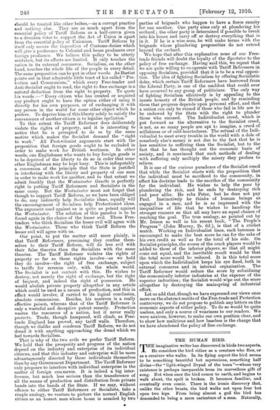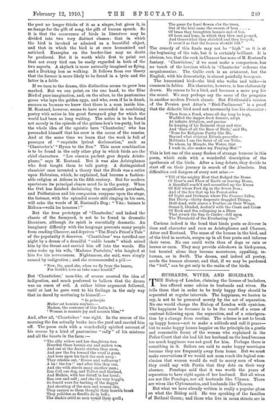THE HUMAN BIRD. T HE imaginative writer has discovered in birds
two aspects. He considers the bird either as a creature who flies, or as a creature who walks. In its flying aspect the bird seems to be something beautiful but mysterious, something half divine—the " light-winged Dryad of the trees "—whose very existence is perhaps inseparable from its marvellous gift of song. But when once the bird comes to earth, and begins to walk about, the spell is broken. It becomes familiar, and eventually even comic. There is the ironic discovery that, unlike the other beasts, the bird walks not upon four but upon two legs. From being almost a god the bird bas descended to being a mere caricature of a man. Naturally,
the poet no longer thinks of it as a singer, but gives it, in exchange for the gift of song, the gift of human speech. So it is that the occurrence of birds in literature may be divided into two very distinct classes : that in which the bird is invoked or admired as a beautiful object, and that in which the bird is at once humanised and satirised. Examples on the border-line may no doubt be .produced. But it is worth while first to point out that not every bird can be easily regarded in both of the two aspects. A skylark is more naturally imagined as flying, and a Dorking hen as walking. It follows from our theory that the former is more likely to be found in a lyric and the latter in a fable.
If we turn to the drama, this distinction seems to grow less marked. But we can point, on the one hand, to the Blue Bird of pure imagination, and, on the other, to the pantomime goose who lays the golden eggs, and who, even if he is dumb, amuses us because we know that there is a man inside him. M. Rostand, however, seems to have succeeded in combining poetry with satire in his great farmyard play for which the world had been so long waiting. The satire is to be found not merely in the episode of the guinea-hen's tea-party, but in the whole idea of the egoistic hero Chantecler,' who has persuaded himself that his crow is the cause of the sunrise. And at the same time we learn that the work is full of passages of " exquisite lyrical declamation," such as Chantecler's ' " Hymn to the Sun." This same combination is to be found in the only other play in which birds are the chief characters. " Les oiseaux parlent grec depuis Aristo- phane," says M. Rostand. But it was also Aristophanes who first taught them to talk poetry. A distinguished
classicist once invented a theory that the Birds was a satire upon Hebraism, which, he explained, had become a fashion- able religion at Athens in the fifth century. But for modern
spectators its principal charm must lie in the poetry. When the Owl has finished declaiming the magnificent parabasis, and Peithetairos and his companion reappear upon the stage, the listener, with the splendid music still ringing in his ears, will echo the words of M. Rostand's Dog : " Vite : baissez le Rideau—voilit lea hommes ! "
But the true prototype of Chantecler,' and indeed the classic of the farmyard, is not to be found in dramatic literature, although its spirit is essentially dramatic. An imaginary difficulty with the language prevents many people from reading Chaucer, and deprives " The Nun's Priest's Tale" of the popularity it deserves. Chanticleer was terrified one
night by a dream of a dreadful " redde beaste " which seized him by the throat and carried him off into the woods. His cries woke up his wife, 'Madame Partelote,' who laughed at him for his nervousness. Nightmares, she said, were simply caused by indigestion ; and she recommended a pill :—
" Now, Sir, quod she, when we fly from the beams, For Geddes love as take some laxatif."
But 'Chanticleer,' man-like, of course scouted the idea of indigestion, and much preferred to believe that the dream was an omen of evil. A rather bitter argument followed, until at last he gave vent to his feelings in the only way that he dared by muttering to himself:— "In principio
Mulier est hominis confusio.— Madam, the sentence of this Latin is : Woman is mannes joy and mannes
And, after all, Chanticleer' was right. In the course of the morning the fox actually broke into the yard and carried him off. The poem ends with a wonderfully spirited account of his rescue by a kind of pantomime " rally" of his mistress and all the beasts in the farm :-
" The silly widow and her daughtren two
Hearden these hennes cry and maken woe, And out at the doores starten they anon, And saw the fox toward the wood is gone, And bore upon his back the cock away : They crieden out, 'Harow and well-away ! A ha! the fox !' and after him they ran, And eke with staves many another man; Ran Coll our dog, and Talbot and Garland, And Malkin, with her distaff in her hand; Ran cow and calf ; and eke the very hogges, So feared were for barking of the dogges And shouting of the men and women eke, They rannen so them thought their hearth break Tey yelleden as flendes do in hell;
The duckes cried as men would them veil;
The geese for fearS flewen o'er the trees, Out of the hive came the swarm of bees . • Of brass they broughten beames and of box, Of horn and bone, in which they blew and pooped, And therewithal they shrieked and they hooped ; It seem'd as that the heaven shoal& fall."
The comedy of this finale may not be "high " as it is at the beginning of the tale, but it is certainly brilliant. It is obvious, too, that the cock in Chaucer has none of M. Rostand's fantasy. Chanticleer,' if we must make a comparison, has no touch of the heroism which in Chantecler ' redeems the
megalomaniac. The Gallic cock is an aristocrat, but the English, with his domesticity, is almost painfully bourgeois.
The humanised bird—the bird who walks and talks—is common in fables. His character, however, is less elaborately drawn. He ceases to be a bird, and becomes a mere peg for the moral. We may perhaps say the same of the penguins in another modern French classic. But FitzGerald's version of the Persian poet Attar's "Bird-Parliament" is a proof that the didactic bird need not necessarily lose his character :
"Then from a Pond, where all day long he kept, Waddled the dapper Duck demure, adept At infinite Ablution, and precise In keeping of his Raiment clean and nice. And 'Sure of all the Race of Birds,' said Ho, 'None for Religious Purity like Me, Beyond what strictest Rituals prescribe— Methinks I am the Saint of all our Tribe. To whom, by Miracle, the Water, that I wash in, also makes my Praying-Mat.' "
This is but one of the many flashes of strange humour in this poem, which ends with a wonderful description of the apotheosis of the birds. After a long debate, they decide to start off on their journey in search of the Absolute. But difficulties and dangers of every sort arise :— " Till of the mighty Host that fledged the Dome
Of Heav'n and Floor of Earth on leaving Home, A Handfull reach'd and scrambled up the Knees Of Ktif whose Feet dip in the Seven Seas ; And of the few that up his Forest-sides Of Light and Darkness where The Presence hides, But Thirty—thirty desperate draggled Things, Half-dead, with scarce a Feather on their Wings, Stunn'd, blinded, deafen'd with the Crash and Craze Of Rock and Sea collapsing in a Blaze That struck the Sun to Cinder—fell upon The Threshold of the Everlasting One."
Curious indeed is the bond that binds poets so diverse in time and character and race as Aristophanes and Chaucer, Attar and Rostand. The sense of the human in the bird, and of the bird in mortals, surges up in all four poets and informs their verse. No one could write thus of dogs or cats or horses or oxen. They may provide sideshows in bird-poems, but treated alone they become monstrous, appalling, in- human, as in Swift. The drama, and indeed all poetry, needs the human element, and that, if we may be pardoned the "bull," can be got only in the realm of the birds.











































 Previous page
Previous page